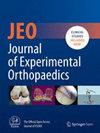Effect of vitamin D on anterior cruciate ligament injury rates and post-reconstruction function—A systematic review
Abstract
Purpose
This systematic review aimed to investigate the association between serum vitamin D levels and key outcomes following anterior cruciate ligament reconstruction (ACLR), including ACL injury risk, postoperative muscle recovery and post-reconstruction functional outcomes.
Methods
We conducted a comprehensive search across five databases (Cochrane Library, EMBASE, MEDLINE, Scopus and Web of Science) until July 2024. Studies were selected based on specific inclusion criteria, such as studies evaluating the relationship between vitamin D and injury risk, ACLR outcomes and muscle strength. Risk of bias was assessed using the MINORS tool, and results were synthesized narratively due to study heterogeneity.
Results
Five studies with 656,243 participants met the inclusion criteria. Most studies reported that low vitamin D levels were associated with a significantly increased risk of ACL injuries and poorer postoperative muscle strength recovery. However, evidence regarding bone health and functional outcomes was inconsistent. No meta-analysis was conducted due to the variability of study designs and outcomes, but qualitative synthesis indicated a potential protective role of vitamin D in ACL recovery.
Conclusions
Vitamin D deficiency appears to increase the risk of ACL injury and impede muscle recovery post-surgery. However, limitations include a high risk of bias and inconsistent evidence on functional outcomes, underscoring the need for further research. The review was registered in PROSPERO (ID: CRD42024584483).
Level of Evidence
Level III, systematic review.


 求助内容:
求助内容: 应助结果提醒方式:
应助结果提醒方式:


